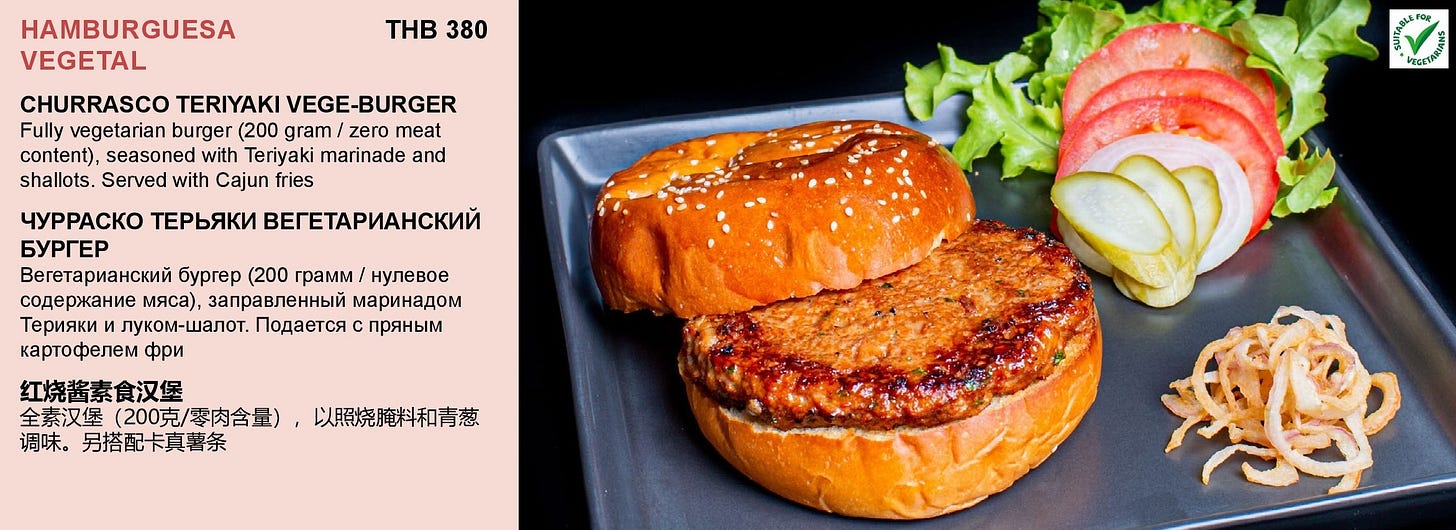The rapid rise of plant based meat substitutes has been one of the more discussed food industry developments over the past decade. At Churrasco Phuket Steakhouse, we decided to add a plant based burger to our Gourmet Burger line-up during the height of the trend. The results became clear quite quickly – we sold roughly one plant based burger per month while consistently serving more than two hundred of our well known affordable Wagyu burgers in the same period.
Impossible Foods and Beyond Meat positioned themselves as disruptive forces that would redefine how people eat. Their early marketing leaned heavily on technological framing and strong environmental messaging. Early predictions assumed these products would move from novelty to widespread adoption. Today, the industry picture is more measured. Revenues are falling, several smaller brands have exited the market and valuations have declined sharply.
Impossible Foods private share value has dropped by close to ninety percent since 2021, to which they responded by undertaking a complete rebrand. The company will move from green packaging to red in an effort to appeal directly to consumers who associate red with appetite and meat. This shift signals a recognition that the original brand identity did not resonate with the broader consumer market.
From our steakhouse operator standpoint, the mismatch has been visible for some time. The early excitement around plant based meat was driven by media attention, “FOMO” investment enthusiasm, and a vocal group of early adopters from the woke spectrum of society.
However, the dining public does not behave in the same way as the promotional cycle. The difference between projected market penetration and actual purchase behaviour reflects several practical barriers that most food service operators have long understood.
Price
Plant based substitutes often cost significantly more than traditional beef. In grocery retail, that difference is easy for consumers to see. In restaurants, the gap becomes even more pronounced. Guests intuitively evaluate value. When a plant based patty is priced close to a traditional steak or to a premium beef burger, very few customers feel compelled to choose it unless they have specific dietary preferences.
Demographics
Research consistently shows that plant based substitutes appeal primarily to younger, urban and higher income consumers. That group is often open to experimentation, but it does not represent the full restaurant market. The typical steakhouse guest spans a much broader set of ages and preferences. Many come precisely because they want a traditional experience built around beef. For them, the appeal of a plant based replica is limited, and rarely repeat driven.
Messaging
A sizable share of plant based marketing relied on moral framing. The suggestion, at times, was that choosing conventional meat was outdated or irresponsible. This approach created unnecessary resistance. Guests do not want dining decisions to be turned into political or cultural statements. Food service success relies on trust, clarity and consistency, not on signalling.
Politics
Especially in the US, plant based products became entangled in cultural debates that had little to do with the actual food. Commentators on both extremes claimed symbolic meaning for these items, ranging from elitism to conspiracy. While such narratives are far removed from industry realities, they influence consumer behaviour. Once a product carries ideological weight, marketing adjustments such as packaging colour changes cannot meaningfully shift perception.
For restaurant operators, the practical takeaway is clear. Initial curiosity may drive trial, but long term adoption relies on habitual use, not on symbolic significance. Across the market, plant based trial rates were high, yet repeat purchase rates were low. Our own experience was consistent with this pattern. Guests were willing to try a plant based burger once, often out of curiosity. Very few returned to it. In contrast, our Wagyu burgers continue to sell at scale because they satisfy established expectations around flavour, texture and value.
Plant based items should not necessarily be excluded from steakhouse menus. Operators still offer them as a courtesy for guests with dietary restrictions or preferences. When presented as a simple menu option rather than as a philosophical statement, these items can serve a practical purpose. The key understanding is that they are supplementary, not transformational.
Image Credit: https://churrascophuket.com
_ _ _
© CHURRASCO PHUKET STEAKHOUSE / ALL RIGHTS RESERVED
Reprinting, reposting & sharing allowed, in exchange for a backlink and credits
Churrasco Phuket Steakhouse serves affordable Wagyu and Black Angus steaks and burgers. We are open daily from 12noon to 11pm at Jungceylon Shopping Center in Patong / Phuket.
We are family-friendly and offer free parking and Wi-Fi for guests. See our menus, reserve your table, find our location, and check all guest reviews here:
https://ChurrascoPhuket.com/
#Churrascophuket #jungceylon #phuketsteakhouse #affordablewagyu #wagyu


Thanks for sharing. I read many of your blog posts, cool, your blog is very good. https://www.binance.com/register?ref=IHJUI7TF